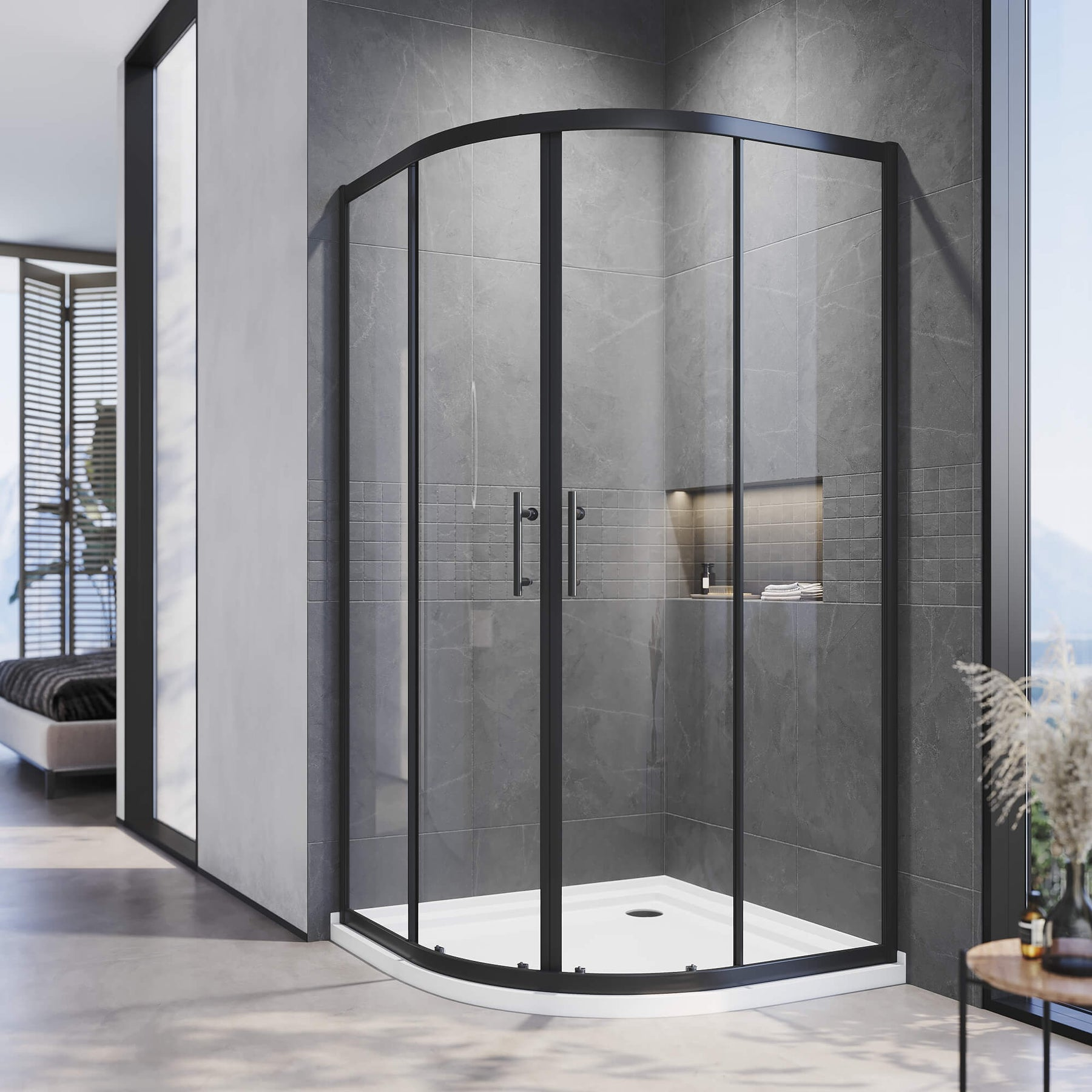Hard water refers to water that contains high amounts of dissolved minerals, most commonly calcium and magnesium. Other minerals found in hard water include iron, manganese, and bicarbonates. The level of hardness is determined by the concentration of these dissolved minerals, especially the calcium and magnesium content.
When hard water evaporates on surfaces, it leaves behind mineral deposits that can cause spotting, scaling, and corrosion issues. This is especially problematic for shower screens and glass as the continuous flow of water leaves mineral residue during and after showering. Over time, these water spots accumulate and turn into stubborn stains that etch into the glass surface. The glass becomes rough and opaque, obstructing visibility and aesthetic appeal.

Further damage can occur as the mineral scales trap moisture and chemicals near the glass, promoting corrosion, pitting and decay of the glass itself. As the glass degrades, more mineral salts penetrate its porous surface, worsening the cycle. Consequently, the shower glass becomes irreversibly dull and opaque over time.
Preventing hard water damage is particularly important in regions with exceptionally high mineral content, such as Australia. Careful selection of shower screen materials coupled with appropriate maintenance techniques can dramatically increase the longevity and clarity of glass in hard water environments. The proper choice of glass coating or surface treatment is also critical for effective protection.
What is Hard Water Composition
Hard water contains high levels of calcium and magnesium, which are positively charged ions. Specifically, the main hardness-causing ions are calcium (Ca2+) and magnesium (Mg2+). Calcium makes up the biggest share - about 2/3rds - of dissolved mineral content in hard water.
These mineral ions have an affinity to bind to negatively charged surfaces, initiating scaling and residue accumulation. Glass carries a net negative charge, which allows the positive calcium and magnesium ions to aggressively adhere to its surface. As hard water evaporates on shower glass, it leaves behind mineral deposits from this ion exchange process.
Moreover, the calcium and magnesium interact with other ions like carbonates (CO32-) and sulfates (SO42-) to form rigid mineral salts like calcium carbonate and magnesium sulfate. These adhere strongly to the glass through precipitate formation and additional electrostatic interactions. Over time, these salts build upon each other, cementing into tough limescale.
Low pH and high temperatures exacerbate scaling issues. Acidic water (below pH 7) corrodes glass surfaces, making them more porous. The etched crevices then provide anchor points for calcium and magnesium to cling and rapidly crystallize. Meanwhile, hot water from shower heating accelerates evaporation as well as dissolution of greater mineral content. Both factors boost surface adhesion and quick accumulation of stubborn mineral scales.

Best Shower Screen Materials for Hard Water Areas
As a homeowner, you should go ahead and buy the best shower screen materials for hard water areas. Here are few of the ideal options available to try.
Tempered Glass
Tempered glass is the most common choice for shower enclosures. In the tempering process, the glass is heat-treated for increased strength and safety. If broken, it shatters into small, rounded pebbles rather than sharp shards. Tempered glass is also more resistant to temperature shifts from hot showers, making it a robust, long-lasting option. It is easy to clean for daily maintenance. However, left unchecked, over time hard water minerals will still etch and erode tempered surfaces.
Coated Glass (Hydrophobic/Nano-Coated)
Coated glass can provide better hard water resistance with hydrophobic and nano-coatings. These surface treatments create a protective barrier that prevents mineral adhesion and residue build-up by repelling water. The coatings also make the glass smoother, further preventing particle adherence, much like a non-stick pan surface.
Silica-based spray coatings work by bonding silicon molecules to the glass at a nano scale. This alters surface tension levels so that instead of sticking, water rolls right off, taking any loose mineral ions along with it. Proper application and periodic re-coating is essential to maintain effectiveness.
Laminated Glass
Laminated glass fuses a secondary sheet of glass or plastic polymer to the inner glass layer with an adhesive interlayer. This shields the main glass substrate from direct water exposure and provides scratch protection. Even if surface minerals erode the outer layer, the interlayer prevents deeper contact with the structural panel. Laminated construction also dampens vibrations from closing doors and deflects impacts from bottles, mitigating crack risks.
Acrylic/Polycarbonate Alternatives
For a lighter and more affordable option, acrylic or polycarbonate plastic sheets can replace glass altogether. Although prone to superficial scratches, plastic composites resist etching and corrosion from minerals. Polycarbonate also withstands heat better than acrylic. However, acrylic transmits more light for a crystal clear view. Over time polycarbonate can become hazy and yellowed due to sun exposure. Overall plastics do not offer the same sleek aesthetic and durability provided by specialized glass products.

Preventive Measures for Spot-Free Glass
There are some effective prevention measures that you can follow to end up with spot-free glass. Read on and let’s explore them in detail.
Water Softeners and Filtration Systems
Installing a whole-house water softener or reverse osmosis system is the most comprehensive solution for minimizing mineral buildup. Popular options include ion-exchange softeners that substitute calcium and magnesium ions with less reactive sodium ions. This reduces the scaling potential of the water.
Salt-free magnetic or electronic softeners take a more environmentally friendly approach by preserving mineral levels using magnetic fields instead. While specific efficacy is disputed, they provide an alternative for those avoiding salt-based softeners. Reverse osmosis systems force water through membranes that filter out magnesium, calcium and other hardness particles, delivering water purity up to 99%.
Daily Maintenance Routines
A simple daily glass squeegee after showering eliminates pooled water rapidly. This prevents standing moisture accumulation for hours that accelerates surface reactions with minerals. Wiping down with a soft microfiber cloth also stops water marks from drying out. HARSH CHEMICAL CLEANERS SHOULD BE AVOIDED as they damage protective glass treatments.
Natural Cleaning Solutions
To safely fight existing scale and stains, spritzing occasional vinegar diluted with water can help dissolve mineral deposits and restore shine. The acetic acid permeates and dissolves salt buildup without endangering coatings. For more stubborn scaling, brush-on pastes made with citric acid offer more aggressive descaling through slightly higher acidity than vinegar solutions. They provide an inexpensive yet effective hard water cleaner alternative to commercial descalers. After application, glass should be thoroughly rinsed.

Advanced Cleaning Solutions for Stubborn Stains
If there are stubborn hard water stains, you will need to follow more advanced solutions. Here are few such methods to try.
Commercial Descaling Products
For severely scaled shower glass, commercial descaling solutions contain powerful active ingredients to dissolve mineral deposits. Phosphoric acid-based descalers work rapidly to break down calcium carbonate, magnesium, and other challenging salt residues. Chelating agents like EDTA capture and detach the loosened particles so they can be easily washed away after soaking. The higher concentrations treat tough hard water stains but may degrade softer glazing with repeated use.
DIY Remedies
Before tackling professional services, some proven home remedies are worth attempting first to remove moderate staining. Creating an abrasive paste using baking soda and water dissolves minerals upon application. Lemon juice contains citric acid perfect for attacking calcium carbonate scaling. For best results, directly apply juice and let it work for a few minutes prior to rinsing and scrubbing. Combining both baking soda and lemon juice creates a reactive fizzing mixture that penetrates challenging build-up.
Professional Glass Restoration
For glass panels with extensive spotting and corrosion damage, professional restoration services may be required. Trained glass technicians have industrial strength equipment to polish away etched deposits and refresh outer surfaces. Diamond abrasive cleaning machines combined with precision air/water nozzles remove impacted layers under controlled conditions. Technicians can restore clarity and light transmittance obstructed by years of accumulated mineral pitting. Basically, resurfacing the top layer, the process prepares the glass for new protective treatments to prevent rapid repeat staining.
Installation and Design Tips
Few installation and design techniques can help you overcome trouble when using shower screens to avoid hard water stains. Let’s take a look at them in detail.
Angled Glass Placement to Encourage Water Runoff
The orientation and framing of shower enclosures can make a difference in managing hard water stains. Angling glass panels encourages better water runoff compared to vertical installation which allows pools of water to linger. Ideally having the shower glass tilted 15-30o outwards guides the streaming path away faster after usage.
Frameless vs Framed Designs – Which Traps Fewer Minerals?
Frameless glass designs have an ultra-sleek modern aesthetic; however framed panels form a watertight seal and structural stability. Framed enclosures use aluminum, composite seals, or gaskets to seal the perimeter with the base shower pan. This blocks leaks and overflow exposure on the back glass edges. Whereas in frameless models, the glass-to-glass corner joints are more vulnerable to flows and leaks introducing mineral residue accumulation or possible discoloration over time from water infiltration.
Sealants and Silicones Resistant to Mold and Mineral Buildup
Special consideration should also be given to using premium silicone sealants reinforced with anti-microbial and anti-fungal properties. Quality bonding silicones prevent staining from mold buildup that thrives in moist glass crevices. Formulas incorporating silver ion technology actively resist microbe adhesion. When replacing old sealant, it is imperative to thoroughly clean out degraded compressed layers which compromise new applications.
Conclusion: Long-Term Strategies for Spot-Free Shower Screens
As you can see, tempered, coated, and laminated glass provide the most durable and stain-resistant options for shower screens in hard water regions. Heat-treated tempered panels resist temperature fluctuations and impacts while specialty coatings repel sticking water mineral particles before they accrue. For even better protection, laminated composites incorporate a bonded middle layer to shield glass from direct exposure.
However, without diligent preventive habits, even the most advanced glass will eventually succumb to gradual mineral erosion. Therefore, consistent squeegeeing paired with softened water systems forms a proactive defense to minimize scale adherence over decades of use. It also allows consumers to balance aesthetics with functionality by potentially using more decorative clear-glass elements that require added maintenance.
By understanding regional water composition, leveraging preventive systems and treatments, enforcing positive cleaning habits, and utilizing resilient materials, homeowners can achieve stunning spot-free shower views built to last. The investment in quality materials and professional restoration services ensures enduring performance where replacement costs are prohibitive.
For further tailored guidance on long-lasting shower glass solutions in hard water environments, visit Elegant Showers AU online store to consult with industry specialists. Together, we can bring your dream oasis to life with peace of mind that its beauty will withstand the test of time. Enjoy the crystal clear possibilities!



